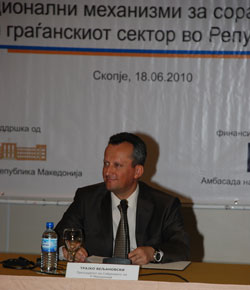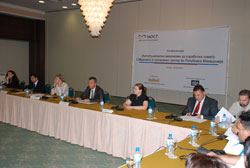Friday, 18 June 2010
ADDRESS BY THE PRESIDENT OF THE ASSEMBLY OF THE REPUBLIC OF MACEDONIA, MR. TRAJKO VELJANOSKI, ON THE CONFERENCE “INSTITUTIONAL MECHANISMS FOR COOPERATION BETWEEN THE ASSEMBLY OF THE REPUBLIC OF MACEDONIA AND THE CIVIL SECTOR IN THE REPUBLIC OF MACEDONIA
 Your Excellency,
Your Excellency,
Distinguished colleagues MPs,
Ladies and Gentlemen,
I am very pleased to have the opportunity to address this Conference for various reasons: first and foremost because the Assembly is supporting this Conference, secondly, because of our cooperation with the NGO sector and because of the need for further development of the partnership with the civil sector which strengthens the overall parliamentary capacity. I would like to underline that the development of the civil sector id especially important for the democratic values of the country and it is an impetus for wider social engagement of the civil sector. This development promotes human rights guaranteed by the Constitution - the freedom of association and protection of the various rights and beliefs, the right of free speech and participatory democracy.
One of the key characteristics of the development of democracy is the degree of inclusion of the citizens in the process of creation of policies. One of the easiest mechanisms to achieve this goal is for the NGOs in the Republic of Macedonia to be included in the education and information of the citizens in order to contribute to the development of a more democratic society.
In this direction it is necessary to aim towards building institutional mechanisms and principles of cooperation and partnership with the NGOs in the process of creation and implementation of the different policies. The key word and mechanism in the creation of this sustainable partnership is the building and reaffirming of the mutual trust.
On the other hand, the NGO sector should work on finding mechanisms and principles which would clearly divide the capacities of the NGO sector. They should work on development of mutual trust and cooperation and should respect particular code of ethics.
This role of the civil sector in the promotion and building of a democratic culture and social cohesion on every social level includes the cooperation with the Assembly of the Republic of Macedonia as well. The Assembly, as a central institution of the citizens and for the citizens, has the responsibility to work on accomplishment of these efforts.
Our close cooperation and partnership are evident and they should be developed in the field of the following parliamentary segments:
- Besides the periodic we should have and regular participation of the NGO sector in events such as the traditional event “Open Parliament” and the International Day of Democracy which is held on 15 September, as well as in many joint projects initiated in the past period; and
- Increased participation in the legislative activities of the Committees and in the public debates;
- Through the recently established scrutiny debates;
- Through the MPs’ offices for contact with the citizens; and
- Cooperation with the newly established Parliamentary Institute.
One of our key partners is the host of this Conference - the Civil Association MOST, which since 2003 has been contributing in the strengthening of the cooperation between the MPs and the constituencies. The project Mobile Parliament, Office for contact between the NGOs and the Assembly, and the Legal Resource Centre are part of the contribution to the having more transparent and more responsible MPs.
One example of cooperation and communication is “My Member of Parliament” - project which stared in 2006 with the ratification of the Memorandum on mutual cooperation which resulted in increased information for the citizens about the work of their MPs in the Assembly, and this project today is realised by the Assembly.
The Assembly Network of Contact Project was also initiated together with MOST. The final stage of the Project is now realized in cooperation with IPD. This Project enables the NGOs and the citizens to use the offices of the MPs in their constituencies and to submit legislative ideas in order to participate in the process of drafting and adoption of laws, which improves the citizens’ trust in the parliament.
In accordance with the Rules of Procedure of the Assembly, the working bodies can invite representatives from the civil associations in order to hear the citizens’ opinions about the topics on the agenda. The Civil Associations can also give initiatives for a debate on particular issues. That is why I would like to encourage the realization of this possibility.
In the area of the scrutiny debates introduced with the Law on the Assembly of the Republic of Macedonia, the assistance provided by NDI is expected to cover the forms and principles for immediate inclusion of the NGOs in the different stages of the debate, especially in the so-called “testimonies”. I expect that the NGOs will have increased participation in the scrutiny debates of the Assembly and in the monitoring of the implementation of the laws.
Special segment of the direct cooperation between the MPs and the civil sector should be the Offices for contact of the MPs with the citizens. These offices should articulate the joint efforts of the citizens regarding various issues of local importance.
 The introduction of the Parliamentary Institute will promote both the legislative and the scrutiny role of the Assembly of the Republic of Macedonia. My expectations for building a new partnership are in this direction. It would be useful if the employees in the Institute use the information and consult the NGO representatives in a new form and dimension of partnership relations.
The introduction of the Parliamentary Institute will promote both the legislative and the scrutiny role of the Assembly of the Republic of Macedonia. My expectations for building a new partnership are in this direction. It would be useful if the employees in the Institute use the information and consult the NGO representatives in a new form and dimension of partnership relations.
The contribution of the NGOs is significant for the promotion and building of the democratic culture and social cohesion on every social level, and in line with this, for the promotion of the Republic of Macedonia in its efforts for Euro-Atlantic Integration. The EU Membership will impose numerous reforms, whose practical implementation involves all the citizens. The Euro-integration process does not only mean adoption of laws, but also their successful implementation with the final goal -improvement of the standard of living and the quality of the citizens’ lives. In this direction the Assembly of the Republic of Macedonia is opened for cooperation with the NGOs focused on the Euro-integration process, and this is confirmed with the fact that an NGO sector representative is a member of the National European Integration Council.
I would like to underline that the Assembly has recently adopted the Law on Associations and Foundations, and this Law was adopted after excessive harmonization with the NGOs and many of the amendments submitted by the NGOs were adopted.
The strengthening the Assembly of the Republic of Macedonia with new human resources in the recent period, along with the building of working space for the MPS and the Assembly Staff which has begun, should optimise our overall parliamentary capacity.
I expect fruitful debate during today’s’ Conference which should give impetus for more intensive cooperation between the NGO sector and the Assembly of the Republic of Macedonia.
Thank you.